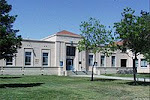I recently added a photo of Thomas Mann to the site because I enjoy his novels. Reading him while I was in my late teens helped prepare me to read Tolstoy and Joyce and many others. Reading Mann prepared me to study the Western tradition. And this was fortunate for me since schools in America have lost contact with the Western tradition and it is nearly impossible to receive a liberal education in present day America. I think the loss of liberal education from our colleges pretty much dooms America since it is what made us what we are, "but if the salt have lost his savour, wherewith shall it be salted?"
It was rather by accident that I began reading Mann. When I was seventeen I ran across Clifton Fadiman's Lifetime Reading Plan in the local library. And his description of Mann's writing made me curious. He said that Mann's novels were stylistically like music. This motivated me to read Mann to see just what he meant. We had had a copy of The Magic Mountain on the bookshelf at home. It had been there my whole life and I'm sure it was a Book of the Month Club selection my father received when I was a small child. So I pulled it down and read it.
The Magic Mountain is long and slow moving which I enjoy in a novel. It is the story of someone as clueless about the Western tradition as I was. Hans Castorp, the main character, accidentally ends up in a TB sanatorium in Switzerland and is exposed to liberal education by some of his fellow patients. It was the perfect book for an educational orphan like me. It gave me some examples of what a real education is like and made me hungry for more.
I ended up reading all of Mann's major novels and began studying the Western tradition. I began studying the ancient Greeks and Romans and continued on from there. I also studied some Eastern thought. I read some of the classics of Taoism, Buddhism and Hinduism and some books explaining them. I prefer the Western tradition but feel that knowledge of the east is essential to a rounded education.
Early on I didn't understand or appreciate the musical nature of Mann's style. But as I read more of his novels and became a better, more careful reader I came to see it and enjoy it. Mann treated his characters like musical themes and performed variations on the theme throughout the work. Certain words, actions and ideas would be regularly associated with a certain character. Then a character and his influence on or association with another character might be hinted at by then showing an association between these words, actions and ideas and the second character without any outright mention of the first character. This added a deeper level of meaning to both characters. Also, as the work progressed, the growth and development or lack thereof of any character could be reflected in the development of the themes associated with that character (the words, actions, ideas, etc.).
Monday, January 21, 2008
Thomas Mann
Subscribe to:
Post Comments (Atom)





















No comments:
Post a Comment